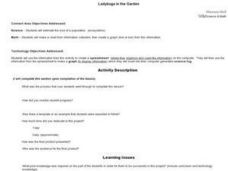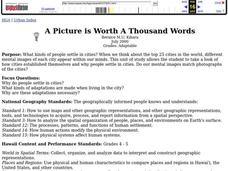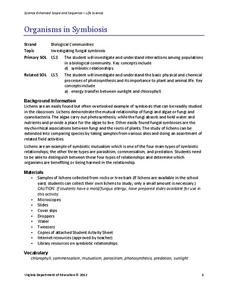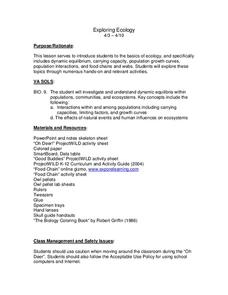Curated OER
Species and Spaces - At Risk at Home
Eleventh graders explore and compare Canadian biomes and investigate species at risk. They describe population growth and eco-regions in terms of climate and geography. They research and create presentations about the natural history and...
Curated OER
Are You Related?
Pupils study microsatellite markers and explain how they might be used to identify populations. They use data to make inferences about the populations of deep-sea corals.
Curated OER
Ladybugs in the Garden
Fifth graders estimate the size a population (ecosystems) Students make a chart from information collected then create a graph (line or bar) from this information. Students do a lesson where they observed, examine, and record data...
Curated OER
I Depend on You, You Depend on Me!
Young scholars explore the interdependency between humans and the ecosystems. They examine how uncontrolled development threatens the rain forests. They discuss how human actions affect the rain forest.
Curated OER
Biotic Factors
Students identify individual organism, a species, and a population within the study community. They identify biotic factors at the site and attempt to characterize the site's species diversity.
Curated OER
Presenting Ecology through Rodent Control
Students role play the member of a health department task force. In groups, they develop their own recommendations to control the rodent problem in the area. They email their local government official and research information about the...
Curated OER
A Picture Is Worth A Thousand Words
Students complete a population pyramid for a city they are studying. They may complete a population pyramid for their city and another one for the country in which the city is located. They compare and contrast the results of the two...
Curated OER
Night Creatures of the Kalahari
Students conduct an experiment to demonstrate how fruit fly populations are controlled by spiders. They observe a variety of environments with fruit flies and spiders and consider how vital spiders are to controlling the insect population.
Curated OER
Insect Biodiversity
Students observe the process of transect sampling using insect nets, to get a chance to compare the presence of different species and populations in various vegetational areas. They study the different specimens caught and compare their...
Curated OER
Trappers Then and Now
Students study how trapping in the Illinois Territory in the 1800's effected the beaver population in the state. They compare methods, rules and regulations of the 1800s to those of today. In groups, they research a variety of...
Curated OER
Sea Stars and the Northern Abalone: A Race for Life!
Students compare and contrast the ecosystem, structure and behavior of survival of the abalone versus the sea star. They consider the ramifications of reintroducing the endangered abalone. They present their findings to the class.
Curated OER
Unit on Globalization and the Environment
Twelfth graders analyze issues affecting ecosystems. They examine the relationships between members of the international comunity. They also examine the concept of sustainable development.
Curated OER
Mammals of Wisconsin
Students explore the exciting world of mammals as they learn the identities of some Wisconsin native residents. They examine their adaptations and learn how they survive in a state with a wide array of temperatures and ecosystems.
Curated OER
Who Lives In The Water
Students investigate the environment of a stream or lake to collect and observe macroinvertebrates in their natural environment. They record data and summarize the information obtained. Students look to see if there has been any human...
Curated OER
Sustaining Life Under the Ice
Students design and conduct experiments in order to identify the components of lake water environments that are affected by winter ice cover. They use the experiment results to propose effective human management of these ecosystems.
Curated OER
Ethical Decision Making in Biology
Students explore a model that illustrates the spread of HIV through an adolescent population. Acting in the role of epidemiologists, students explore the dilemmas of HIV infection presented by a simulation. Students produce a play, skit,...
Curated OER
Amphipods
High schoolers identify organisms that live at the bottom of the body of water. For this biology lesson, students evaluate the effects of pollution to amphipods population. They examine collected data and create a bar graph comparing them.
Virginia Department of Education
Organisms in Symbiosis
Searching for an activity that allows emerging biologists to explore symbiosis up close and personal? Pupils collect samples and view lichens through a microscope and conclude with a discussion about the relationship they have...
Curated OER
Exploring Ecology
Students explore the basics of ecology through numerous hands-on and relevant activities. They participate in an online food chain demonstration, which explores food web dynamics. They dissect owl pellets, examine the prey's bones, and...
Curated OER
Lotic Environment
Students assemble a classroom river model as an example of a lotic system. They control and measure biotic and abiotic information for the in-class system and compare data with a lotic system in a natural environment.
Curated OER
Loss of Wetlands: Subsidence
Students observe subsidence and the effect it has on wetlands with a classroom demonstration. They think about the impact of global warming and the sea level and how it affects the marsh.
Curated OER
Hopskotch Migration
Students understand the use of the wetlands by migrating birds and identify causes for disappearance of the wetlands.
Curated OER
Hopscotch Migration
Students examine the use of wetlands by migrating birds. They discuss reasons for the disappearance of wetlands. They discover how humans have affected wetlands as well.
University of Minnesota
What's the Deal? Addiction Card Game
Addiction is a big deal! Playing a game of cards helps learners understand the concept of addiction. Through their analysis, they examine the potential for addiction and how it varies for each individual.

























